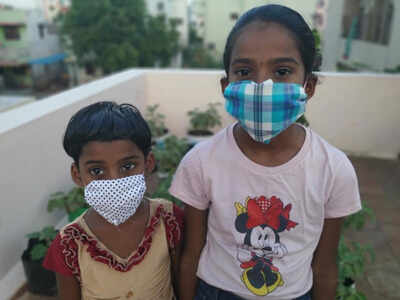
NEW DELHI: The lockdown relaxation measures from April 20 as announced by ministry of home affairs are expected to ease the burden on a section of people, but they have negligible significance for industries as the capital doesn’t have any major manufacturing and industrial hubs.
Also, the relaxations given for agricultural and related activities, fisheries, plantations and animal husbandry are of hardly any importance because these activities are present on a minimal scale.
Moreover, with the MHA order specifying that there will be a strict ban on sale of liquor, Delhi government will not be opening liquor shops till the period of lockdown. A couple of days ago, the AAP government was exploring the possibility of opening liquor shops and had sought a report on it.
As part of the relaxations, people will be allowed to call care providers at home, anganwadis will become operational, all goods traffic will be allowed to ply, electricians, plumbers and IT repair personnel will be allowed to work, e-commerce companies and vehicles used by them will be allowed to ply and courier services can start. Construction projects will be allowed where no workers are required to be brought from outside.
In all workplaces, wearing of face mask will be mandatory. All offices will have to maintain social distancing and no gathering of five or more people will be allowed. Arrangements will also have to be made for temperature screening and providing hand sanitizers. Staggered lunch breaks and a gap of one hour between shifts will also have to be ensured. All organisations will be required to sanitise the workplaces between shifts.
All trucks and goods vehicles with two drivers and one helper will be allowed movement. Truck repair shops and dhabas along highways will also be allowed to function.
However, the relaxations won’t be applicable for containment zones. While no public transport will be allowed, all essential services will continue. All educational, training and coaching institutions will remain closed. The district authorities have been asked to encourage home delivery to minimise the movement of individuals outside their homes.
All factories and establishments will have to arrange special transportation facility and the vehicles will only be allowed to run at 30-40% passenger capacity.
All departments of Delhi government will work with a restricted number of staff. Group A and B officials can attend office as required, but only 33% of the strength of group C and levels below can come to work so that social distancing is maintained.
Lieutenant governor Anil Baijal reviewed the enforcement of the lockdown with senior officers and directed them to ensure compliance of all directions of the central government to break the chain of transmission of Covid-19.
Also, the relaxations given for agricultural and related activities, fisheries, plantations and animal husbandry are of hardly any importance because these activities are present on a minimal scale.
Moreover, with the MHA order specifying that there will be a strict ban on sale of liquor, Delhi government will not be opening liquor shops till the period of lockdown. A couple of days ago, the AAP government was exploring the possibility of opening liquor shops and had sought a report on it.
As part of the relaxations, people will be allowed to call care providers at home, anganwadis will become operational, all goods traffic will be allowed to ply, electricians, plumbers and IT repair personnel will be allowed to work, e-commerce companies and vehicles used by them will be allowed to ply and courier services can start. Construction projects will be allowed where no workers are required to be brought from outside.
In all workplaces, wearing of face mask will be mandatory. All offices will have to maintain social distancing and no gathering of five or more people will be allowed. Arrangements will also have to be made for temperature screening and providing hand sanitizers. Staggered lunch breaks and a gap of one hour between shifts will also have to be ensured. All organisations will be required to sanitise the workplaces between shifts.
All trucks and goods vehicles with two drivers and one helper will be allowed movement. Truck repair shops and dhabas along highways will also be allowed to function.
However, the relaxations won’t be applicable for containment zones. While no public transport will be allowed, all essential services will continue. All educational, training and coaching institutions will remain closed. The district authorities have been asked to encourage home delivery to minimise the movement of individuals outside their homes.
All factories and establishments will have to arrange special transportation facility and the vehicles will only be allowed to run at 30-40% passenger capacity.
All departments of Delhi government will work with a restricted number of staff. Group A and B officials can attend office as required, but only 33% of the strength of group C and levels below can come to work so that social distancing is maintained.
Lieutenant governor Anil Baijal reviewed the enforcement of the lockdown with senior officers and directed them to ensure compliance of all directions of the central government to break the chain of transmission of Covid-19.

Coronavirus outbreak
Trending Topics
LATEST VIDEOS
City
 Watch: 'Yamraj' walks around streets in Bihar’s Munger to remind people about Covid-19 danger
Watch: 'Yamraj' walks around streets in Bihar’s Munger to remind people about Covid-19 danger  Moradabad stone-pelting: Injured doctor narrates horrific incident
Moradabad stone-pelting: Injured doctor narrates horrific incident  Covid-19: Accused in Bandra migrant gathering sent to police custody till April 21
Covid-19: Accused in Bandra migrant gathering sent to police custody till April 21  Watch: Jammu witnesses traffic jam despite extension of lockdown
Watch: Jammu witnesses traffic jam despite extension of lockdown
More from TOI
Navbharat Times
Featured Today in Travel
Get the app





